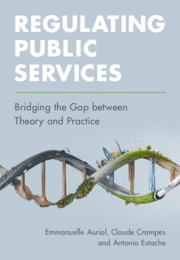Book contents
- Reviews
- Regulating Public Services
- Regulating Public Services
- Copyright page
- Contents
- Figures
- Tables
- Boxes
- Foreword
- Preface
- Acknowledgements
- Symbols
- Abbreviations
- 1 Introduction
- 2 Defining a Theoretical Normative Benchmark
- 3 Thinking Like a Monopoly about Price and Output
- 4 Regulating a Monopoly with Full Information
- 5 Regulating under Informational Constraints
- 6 Regulatory Rules to Set the Average Price
- 7 Linking Regulatory Theory to Practice through Finance
- 8 Non-Linear Pricing in Regulation
- 9 Social Concerns in Regulatory Design
- 10 Regulating Quality
- 11 On the Regulation of Investment
- 12 Regulating Multi-Product Oligopolies
- 13 Abuse of Market Power in (De)Regulated Industries
- 14 On the Relevance of Institutional Quality
- 15 Emerging Regulatory Challenges
- Bibliography
- Index
3 - Thinking Like a Monopoly about Price and Output
Published online by Cambridge University Press: 27 January 2022
- Reviews
- Regulating Public Services
- Regulating Public Services
- Copyright page
- Contents
- Figures
- Tables
- Boxes
- Foreword
- Preface
- Acknowledgements
- Symbols
- Abbreviations
- 1 Introduction
- 2 Defining a Theoretical Normative Benchmark
- 3 Thinking Like a Monopoly about Price and Output
- 4 Regulating a Monopoly with Full Information
- 5 Regulating under Informational Constraints
- 6 Regulatory Rules to Set the Average Price
- 7 Linking Regulatory Theory to Practice through Finance
- 8 Non-Linear Pricing in Regulation
- 9 Social Concerns in Regulatory Design
- 10 Regulating Quality
- 11 On the Regulation of Investment
- 12 Regulating Multi-Product Oligopolies
- 13 Abuse of Market Power in (De)Regulated Industries
- 14 On the Relevance of Institutional Quality
- 15 Emerging Regulatory Challenges
- Bibliography
- Index
Summary
Understanding the details of the way public service providers get their market power and use is essential to the design of regulatory supervision. The Lerner index is one of the most basic indicators available to assess the risks of abuses from market power. It measures the percentage of extra profit the firm can earn per unit sold on top of the marginal cost. A laissez-faire monopoly chooses its price to equate this Lerner index to the inverse of demand elasticity. When demand is inelastic, the firm can raise its price without cutting into sales. Prices’ regulation aims to alleviate this problem of rent extraction. But all financially viable pricing strategies delivering financial viability create deadweight losses as compared to marginal cost pricing. The only way in which marginal cost pricing and the financial sustainability of the operator can be reconciled is through subsidies. To compensate for the lack of competition in the market, regulators have tried to introduce competition for the market, but implementation failures have resulted in high prices and low quality. Welfare losses of regulatory failures in the public utilities sector range from 1% to 1.5% of GDP.
- Type
- Chapter
- Information
- Regulating Public ServicesBridging the Gap between Theory and Practice, pp. 59 - 79Publisher: Cambridge University PressPrint publication year: 2021



